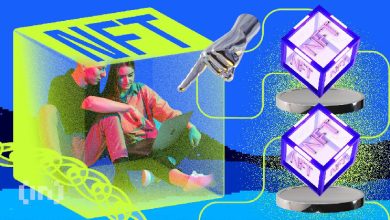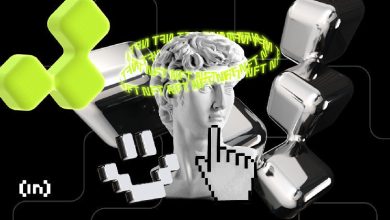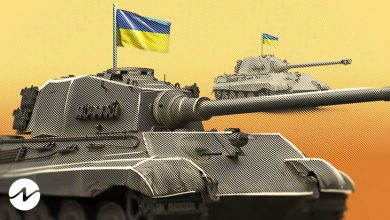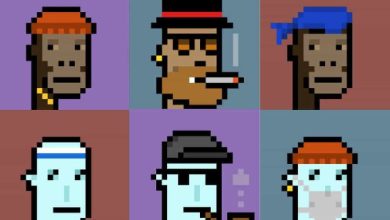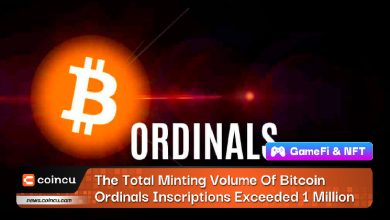How CC0 can help — or hurt — NFT projects
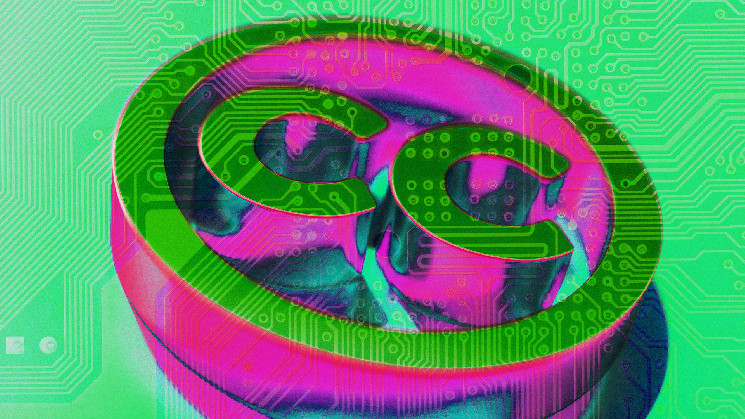
NFT
www.theblock.co
11 September 2022 09:15, UTC
Studying time: ~6 m
Artistic commons (CC0) licensing is, but once more, within the highlight in crypto. Following Nouns, Goblintown and Cryptodickbutts, Moonbirds turned the newest blue-chip NFT undertaking to position its work within the public area – albeit, with some controversy.
Kevin Rose, co-founder of the group that created Moonbirds and its sister undertaking Oddities, printed a Tweet thread on Aug. 4, 2022 stating that the 2 tasks would take away their copyright. Anybody may freely construct upon and monetize their mental property.
The choice sparked outrage from Moonbirds and Oddities holders who bought these belongings considering they’d the only real the flexibility to monetize the artwork related to their NFT. In a single day, with out consulting Moonbird or Oddities homeowners, anybody would have that privilege. Some mental property legal professionals occasion known as it a “bait and change.”
Beneath the controversial motion of Rose and his inventive workforce was a guess: that CC0 is in the end the most effective kind of copyright to have for Moonbirds and Oddities. Why else would they make the choice with out notifying the holders?
CC0 is a kind of inventive software that dedicates a piece to the general public area, which means a creator provides up all copyright and lets others freely distribute, construct upon and commercialize their work.
Eradicating copyright permits tasks to develop their manufacturers by way of spinoff use that doesn’t want permission from or attribution to the unique founding workforce.
Some copyright legal professionals say that CC0 can weaken an NFT undertaking’s model by forgoing the correct to take down dangerous derivatives and eradicating the worth of shortage from proudly owning an NFT from that undertaking.
The case for copyright
So, why would a undertaking decide to make use of copyright? A few of the most useful NFT tasks, equivalent to Yuga Labs’ Bored Ape Yacht Membership and Larva Labs’ CryptoPunks, have created — and defended — their very own copyright phrases.
Copyright primarily permits people to have a monopoly over their creation for a sure interval, says mental property lawyer Jeremy Goldman, a accomplice within the litigation group at Frankfurt Kurnit Klein and Selz. Relying on the kind of copyright license a creator adopts for his or her work, others could use that creator’s work for industrial and spinoff use with or with out attribution — however the mental property itself belongs to the unique creator.
When a creator copyrights their work, they’re saying to shoppers, “if you would like for those who like what I’ve created, and also you need to use it and need to get pleasure from it, I’m the one one who may give you permission to do this,” Goldman provides. By copyrighting their work, creators can search authorized motion in opposition to those that they deem tread on their mental property.
Each Yuga Labs and Larva Labs have sought authorized motion in opposition to derivatives that bore too shut a likeness to their tasks.
Copyright is designed to assist creators monetize their work by having the unique proper to promote their mental property and deter theft explains Sohaib Mohammad, an mental copyright lawyer in Toronto. Larva Labs even went so far as to restrict the amount of cash a CryptoPunk holder could make off their NFT to $100,000, The Block beforehand reported.
Nevertheless, the very nature of NFTs and blockchain provides a complicating layer to copyright. There’s a “essential” distinction between the NFT and the artwork related to that NFT, Goldman says. As soon as an NFT is minted, “it’s out within the wild,” he provides. Yuga Labs or every other NFT workforce “has completely no proper or potential or energy to do something concerning the non-fungible token itself as soon as it has been transferred out of their sensible contract.”
The ultimate choices concerning the artwork, or music or video related to an NFT for that matter, is in the end left as much as the unique creators, Goldman says.
“Once you purchase the NFT, you are getting some extra layer of [ownership] rights, however you are not getting the mental property rights within the artwork. That is why there’s some confusion. These mental property rights are fully managed by the artists,” Goldman provides.
As a consequence of this complication of asset possession and copyright, some NFT tasks have determined to forgo copyrighting their work altogether by adopting CC0.
Floor CC0
If copyright provides obstacles to a piece, then, CC0 “works just like the upside-down world of copyright,” Goldman says.
A undertaking with CC0 is easy. In contrast to with the early days of Larva Labs, which had unclear copyright guidelines, the principles of CC0 permits anybody to do no matter they need with the mental property of the work with out the creator’s permission.
CC0 removes the commercialization and use limits of a piece as nicely, which is the explanation why the founders of NounsDAO determined to undertake it. The Nounders, because the founding workforce of the undertaking known as, wished anybody to have the ability to freely reproduce or create spinoff work that factors again to Nouns. It’s like how citations in the end strengthen an educational paper, Nouns co-founder Punk 4156 beforehand advised The Block.
Nevertheless, the limitless reproducibility that comes with CC0 isn’t with out danger. Racist, sexist, xenophobic or different dangerous components that may weaken a public area undertaking’s model, says Omar Abdallah, legal professional at Rose Regulation Group. If that’s the case, there’s not a lot authorized recourse the undertaking’s workforce can take. As was the case with Nouns, the potential for dangerous spinoff works was a danger they had been prepared to take.
So in relation to including CC0 to an NFT undertaking, “I feel it [CC0] can weaken the model. I feel you may as well strengthen the manufacturers, it actually relies upon,” says Omar Abdallah.
Whereas CC0 is a comparatively newer development in NFT tasks than copyright, present information exhibits that CC0 has decrease commerce quantity and transactions ranges than copyrighted ones. The highest undertaking copyrighted undertaking, Bored Ape Yacht Membership, has 3 times the gross sales quantity as the highest undertaking CC0 undertaking Moonbirds.
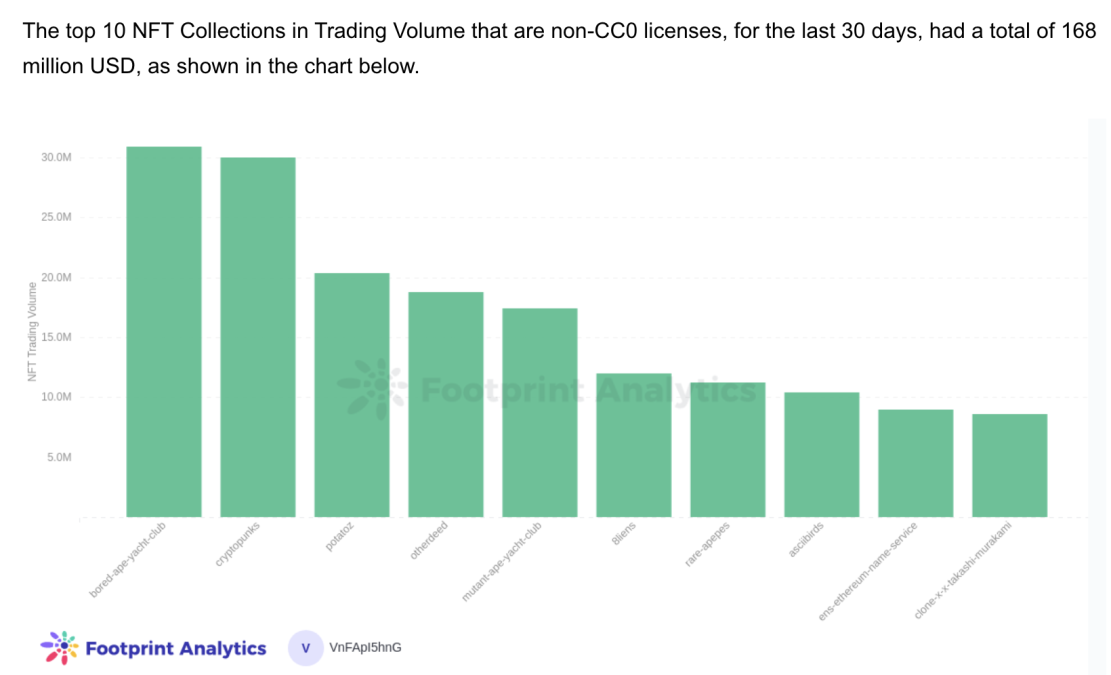
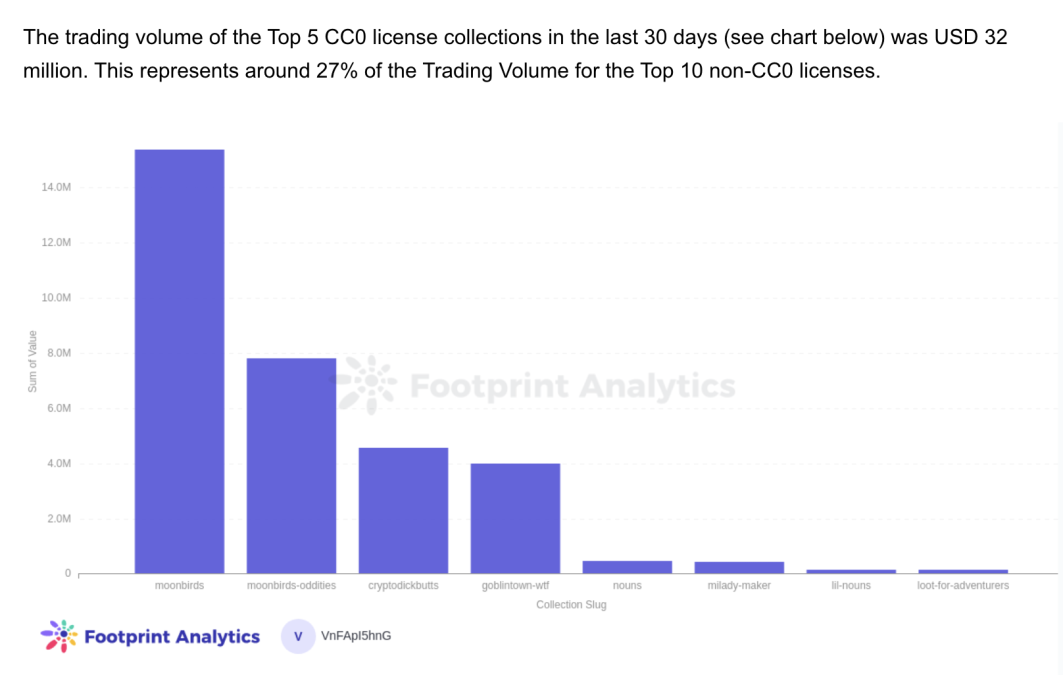
There is no such thing as a one-size-fits-all copyright license for NFT tasks, Mohammad says. The kind of copyright a undertaking does or doesn’t undertake needs to be based mostly on whether or not the undertaking founders need holders to take care of industrial rights or whether or not they need the general model’s recognition to flourish by way of freely made spinoff work.
Whereas CC0 and copyright have their makes use of for NFT tasks, there’s a gray space that’s typically missed in these conversations, says Florida-based mental property lawyer Daniel Barsky.
“Individuals overlook there is a there is a idea of ‘truthful use’ in copyright legislation,” he says. “There’s at all times been the flexibility to pretty use copyrighted works for a wide range of functions, proper parody. It is not prefer it’s at all times been the state of affairs the place if there is a copyright on a bit of IP, it should be perpetually walled off.”

